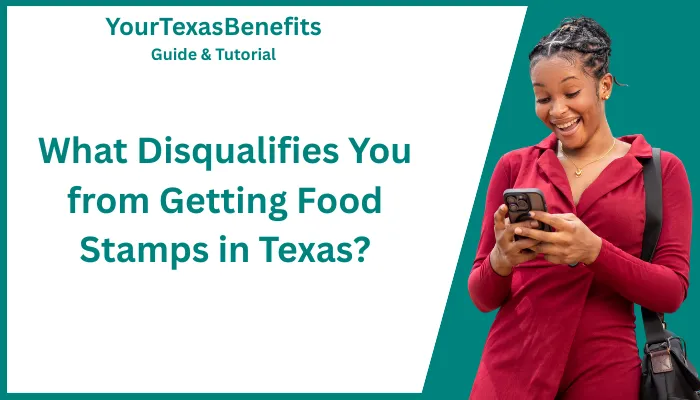Struggling to put food on the table? You may be considering the Supplemental Nutrition Assistance Program (SNAP), but not everyone qualifies. What disqualifies you from getting food stamps in Texas? The answer depends on income, employment, and other eligibility factors listed on the YourTexasBenefits website.
Understanding these rules can help you avoid unexpected denials and ensure you meet the program’s requirements. Additionally, many applicants unknowingly disqualify themselves due to small mistakes, making it crucial to understand all the details before applying.
In this article, we’ll break down the common disqualifications, from income limits to residency requirements, so you know exactly where you stand. We will also discuss special conditions that could impact eligibility, such as exceptions for disabled individuals, college students, and mixed-status households.

Income and Financial Eligibility Requirements
One of the biggest factors in determining SNAP eligibility is your income. What disqualifies you from getting food stamps in Texas? Exceeding the income threshold is a primary reason for denial.
Texas follows federal income guidelines, which set limits based on household size. Generally, households must have a gross monthly income below 130% of the Federal Poverty Level (FPL) and a net monthly income below 100% of the FPL after deductions. This means that even if you earn above the gross limit, certain deductions, such as medical expenses or childcare costs, could still make you eligible.
Income Limits for SNAP in Texas (2025)
| Household Size | Gross Monthly Income Limit (130% FPL) | Net Monthly Income Limit (100% FPL) |
|---|---|---|
| 1 | $1,580 | $1,215 |
| 2 | $2,137 | $1,643 |
| 3 | $2,694 | $2,072 |
| 4 | $3,250 | $2,500 |
Other financial disqualifications include:
- Excessive assets – Households with countable resources exceeding $2,750 (or $4,250 if a member is elderly or disabled) may be ineligible.
- Failure to report income changes – If your household income increases and you do not report it, your benefits may be revoked.
- Irregular income sources – Self-employed individuals with inconsistent income may face stricter scrutiny to prove financial need.
If your income or assets exceed these limits, you may not qualify for SNAP benefits in Texas. However, applying with the correct deductions can increase your chances of approval.
Employment and Work Requirements
For many adults, employment status is a critical factor in SNAP eligibility. What disqualifies you from getting food stamps in Texas? Not meeting work requirements is a common reason.
Who Must Meet Work Requirements?
- Able-bodied adults without dependents (ABAWDs) must work or participate in a qualifying training program for at least 80 hours per month to receive benefits.
- Failing to meet this requirement for three months in a three-year period can result in disqualification.
- Individuals enrolled in job training programs or performing community service may be exempt from full-time work requirements.
Exceptions to Work Requirements:
- Pregnant individuals
- Seniors (50+ years old)
- People with disabilities
- Caregivers for dependents
- Full-time students meeting specific criteria
Additionally, if you are unable to work due to a temporary or chronic medical condition, providing medical documentation may allow you to continue receiving benefits.
If you’re an ABAWD and don’t meet work requirements, your SNAP benefits could be at risk. But if you qualify for an exemption, you may still be eligible.
Immigration and Residency Status
SNAP benefits are only available to U.S. citizens and certain qualified non-citizens. What disqualifies you from getting food stamps in Texas? Your immigration status plays a significant role.
Disqualifying Factors:
- Undocumented immigrants are not eligible for SNAP benefits.
- Certain visa holders (e.g., tourists, students) do not qualify.
- Non-citizens without five years of lawful residence may be ineligible, unless they meet specific criteria (e.g., refugees, asylees, lawful permanent residents under special conditions).
- Individuals with temporary protected status (TPS) may or may not qualify depending on federal regulations.
However, mixed-status households may still qualify if some members (such as U.S. citizen children) meet eligibility requirements. In these cases, benefits are calculated based only on the eligible members’ needs.
Criminal History and Program Violations
Your past actions can also affect your eligibility. What disqualifies you from getting food stamps in Texas? Certain criminal records or SNAP violations can lead to disqualification.
Factors That Can Disqualify You:
- Felony drug convictions – In Texas, individuals convicted of drug-related felonies after August 22, 1996, may face restrictions on SNAP benefits. However, participation in a state-approved treatment program may allow reinstatement.
- Fraudulent activity – Lying on an application, selling SNAP benefits, or committing other forms of fraud can result in a temporary or permanent ban.
- Violating program rules – Repeated violations, such as misusing EBT cards, can lead to disqualification.
- Fleeing felons – Individuals with outstanding warrants for serious crimes may be disqualified.
Additionally, if you have been disqualified due to fraud, you may need to repay any improperly received benefits before reapplying.
Criminal history or past fraud can impact your ability to receive food stamps. However, in some cases, rehabilitation programs or repayment of overissued benefits may restore eligibility.
Conclusion
Understanding What Disqualifies You from Getting Food Stamps in Texas? is essential if you’re applying for assistance. Income limits, work requirements, immigration status, and criminal history all play a role in determining eligibility. However, exceptions exist, and knowing your options can increase your chances of approval.
If you’re unsure whether you qualify, consider reviewing Texas SNAP guidelines or consulting with a benefits specialist. Have questions about your eligibility? Drop a comment below!
